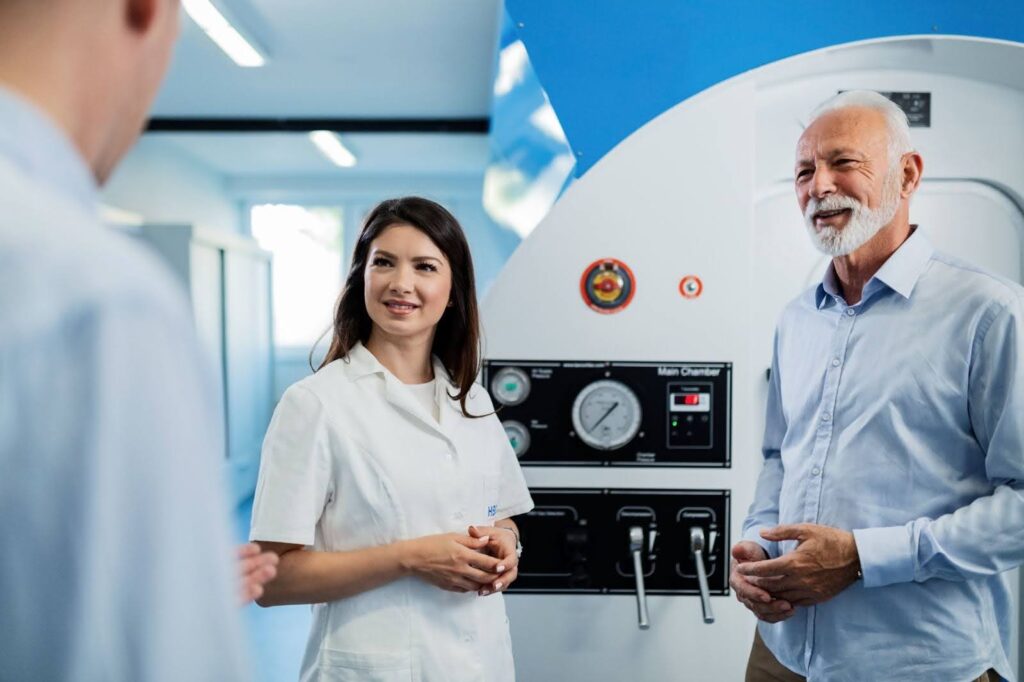
What Patients Should Ask Before Trying Regenerative Medicine
Some treatments sound too promising to ignore. Regenerative medicine often appears that way to people dealing with chronic pain, injuries, or degenerative conditions. Healing from within, without surgery, pulls in hope like a magnet. But with that hope comes a flood of confusing claims, overpromising clinics, and science that’s still catching up. Patients need clarity before they invest time, money, and trust.
Understanding Regenerative Medicine First
Many people hear the term and think it’s a miracle fix. Others assume it’s just another medical trend. However, regenerative medicine encompasses a broad and evolving field with significant potential. Before asking the right questions, you must understand what you’re considering.
What Exactly is Regenerative Medicine?
Regenerative medicine focuses on repairing, replacing, or regenerating damaged cells or tissues. It includes treatments like stem cell therapy, platelet-rich plasma (PRP), and tissue engineering. These approaches aim to support the body’s healing processes. However, not all are proven, approved, or regulated in the same manner. That’s where confusion begins. Just because a therapy uses your cells doesn’t mean it’s safe or effective.
What Conditions is it Commonly Used For?
Many clinics advertise regenerative medicine as a treatment for joint pain, arthritis, tendon injuries, and spinal conditions. Some offer it for cosmetic uses or sexual health issues. These applications vary in credibility and clinical support. For example, PRP is well-studied for knee osteoarthritis, but not for every type of injury. It’s essential to determine whether your condition has any supporting research or is being used as part of a sales pitch. Matching your needs with actual science helps you avoid false hope.
How Much of it is Still Experimental?
Some regenerative treatments are still being tested in clinical trials. Others are already used in hospitals for bone marrow transplants or wound healing. However, many therapies remain unproven in private clinics. Patients should ask if the treatment is part of a research study or is fully established. Being in an early stage doesn’t mean it’s unsafe, but it does mean you need to exercise more caution. Knowing the scientific status gives you the power to make informed choices.
What to Ask Before Starting Regenerative Therapy
Hope is powerful, but it shouldn’t replace clear thinking. Regenerative medicine promises healing, yet every promise deserves scrutiny. Asking the right questions helps you avoid guesswork and costly mistakes. What follows are the essential things to clarify before moving forward.
What Should Be Known About Science and Safety?
The science behind regenerative medicine continues to expand, but the same can’t be said for regulation or transparency. Patients must distinguish between legitimate research and inflated marketing. Without clear answers, the risks can outweigh the potential benefits. Staying informed protects both health and finances.
Does the Treatment Have Strong Clinical Evidence?
Clinical evidence refers to controlled, peer-reviewed studies, not personal stories or general claims. Providers should be able to show published research relevant to the specific condition being treated. If that proof isn’t available or is evaded, it serves as a warning. General statements about stem cells don’t count as proof. The treatment should align with existing research for the patient’s specific case. Otherwise, there’s a risk of paying for something unproven.
Are the Risks and Complications Clearly Explained?
Every procedure has risks, even when using a patient’s cells. Depending on where and how the treatment is applied, these can include infection, swelling, or nerve damage. A trustworthy provider outlines both familiar and less frequent risks in plain language. When a clinic focuses only on benefits, that’s a red flag. Patients need a complete picture to make informed choices.

Are the Cells or Materials Properly Regulated?
Not all stem cells or biological materials are subject to the same regulations. It’s important to ask whether the source is autologous (from the patient) or donor-based. Patients should also ask how materials are processed, stored, and labeled. Some treatments may fall outside FDA approval but still require compliance with strict guidelines. Words like “FDA registered” can be misleading, so direct clarification is essential.
How Are Regenerative Medicine Clinics Regulated Today?
Oversight of regenerative clinics depends on how and where treatments are offered. Hospital-based procedures follow strict rules, but many private clinics operate under looser standards. Some use FDA exemptions to bypass full approval, especially for same-day, same-patient use. Patients should ask which category the treatment falls under, specifically whether it’s classified as 361 or 351, and whether it’s approved or registered. State medical boards can also confirm provider licensing. These checks help identify clinics that use loopholes to appear more legitimate than they actually are.
How to Know If the Provider and Process Are Trustworthy
The quality of care depends on who performs the treatment and how it’s done. Background, training, and procedural detail matter as much as the therapy. Knowing what to expect helps avoid complications or unmet expectations. Each part of the process deserves scrutiny.
What Experience and Training Does the Provider Have?
Regenerative medicine requires specialized knowledge. Patients should ask whether the provider is board-certified in orthopedics, sports medicine, or pain management. It’s also fair to ask how long they’ve performed the specific procedure. Clinics that rely on underqualified staff raise concerns. Proper credentials should back up any clinical claims.
What Steps Are Involved Before and After Treatment?
Clear explanations should cover preparation, cell collection, handling of the material, and the actual delivery method. Patients should also ask about aftercare, possible restrictions, and recovery timelines. Will activity need to be limited? Are follow-up visits required? Understanding what the process includes builds trust and aids recovery.
How Often is the Procedure Typically Repeated?
Some patients may require only one session, while others may need multiple sessions. It’s essential to inquire about the frequency of this treatment for similar cases. Additionally, inquire about the duration of the results and the available options if symptoms recur. Vague answers may signal a lack of experience or planning. Clarifying the timeline upfront avoids financial and medical surprises.
Will Imaging Be Used to Guide the Procedure?
Precision matters when cells or plasma are injected into joints, tissue, or the spine. Ask whether ultrasound or fluoroscopic imaging is used during the procedure. Blind injections may lower success rates or introduce avoidable risks. Real-time guidance increases accuracy and shows attention to detail. A clinic that uses it demonstrates procedural care.

What Are the Treatment Costs and Expectations?
Regenerative medicine often comes with a high cost, and insurance coverage may not be sufficient to cover these expenses. Patients should receive a comprehensive understanding of the financial commitment and the expected outcomes. Having these answers avoids misunderstandings and frustration. A clear plan leads to more intelligent decisions.
What Will the Treatment Realistically Cost Out of Pocket?
Prices can range widely, and hidden fees are standard. Patients should request a detailed breakdown of all costs, including imaging, laboratory tests, consultations, and follow-up appointments. It’s also worth asking about refund policies or package pricing. Most insurance companies won’t cover these services, so estimates should be transparent. Knowing the total cost helps patients assess value and feasibility.
What Results Are Realistic for This Condition?
No one can guarantee full recovery or total pain relief. Providers should explain what kind of improvement is typical and how long it might take. Some measure success in terms of mobility gains, while others measure pain reduction. Patients should ask how the clinic defines outcomes. Honest answers help set proper expectations and reduce disappointment.
Will Progress Be Tracked Over Time?
Tracking outcomes shows a provider’s commitment to care, not just revenue. Ask how the clinic monitors patient response through imaging, movement tests, or self-reported data. Ongoing assessment keeps both the provider and the patient informed. It also helps identify whether further sessions are genuinely needed. A lack of follow-up could indicate poor quality control.
What Ethical Issues Exist in Regenerative Medicine?
No one can guarantee full recovery or total pain relief. Providers should explain what kind of improvement is typical and how long it might take. Some measure success in terms of mobility gains, while others measure pain reduction. Patients should ask how the clinic defines outcomes. Honest answers help set proper expectations and reduce disappointment.
Spotting Red Flags in Regenerative Medicine
Not every clinic is looking out for your best interest. Marketing can blur the line between possibility and fantasy. Knowing the warning signs can keep you from making a decision you regret.
Are They Promising a Cure?
Words like “guaranteed,” “100% success,” or “permanent fix” should make you pause. Medicine doesn’t work that way, especially in areas still under study. Ask how they define success and what their failure rate is. A credible provider should admit limits and discuss alternatives. Overpromising often hides underdelivering.
Is the Clinic Using High-Pressure Sales Tactics?
You shouldn’t feel rushed, guilty, or pushed into a decision. Some clinics use time-limited offers, packages, or emotional appeals to encourage patients to make a decision. Ask yourself if you feel comfortable saying no. If the provider continues to push, walk away. Genuine care doesn’t require urgency.
Are They Avoiding Questions About Research or Regulations?
Be cautious if a clinic can’t answer basic safety, research, or oversight questions. Some dodge the topic with vague claims or dismiss the need for evidence. That’s not a good sign. Ask directly: “Is this treatment backed by studies for my condition?” If they change the subject, trust your instincts and look elsewhere.
Ask First or Regenerative Medicine May Cost You Later
Treatments that promise healing can still carry risks, costs, and gaps in evidence. Asking bold, informed questions doesn’t just protect your body; it shows you’re in charge of your care. The correct answers aren’t optional; they’re the difference between progress and disappointment. Start with curiosity, follow with clarity, and don’t settle until every concern is addressed.
Make informed decisions with confidence. Explore the Stem Health Plus LLC blog for honest advice and up-to-the-minute insights into regenerative medicine.
